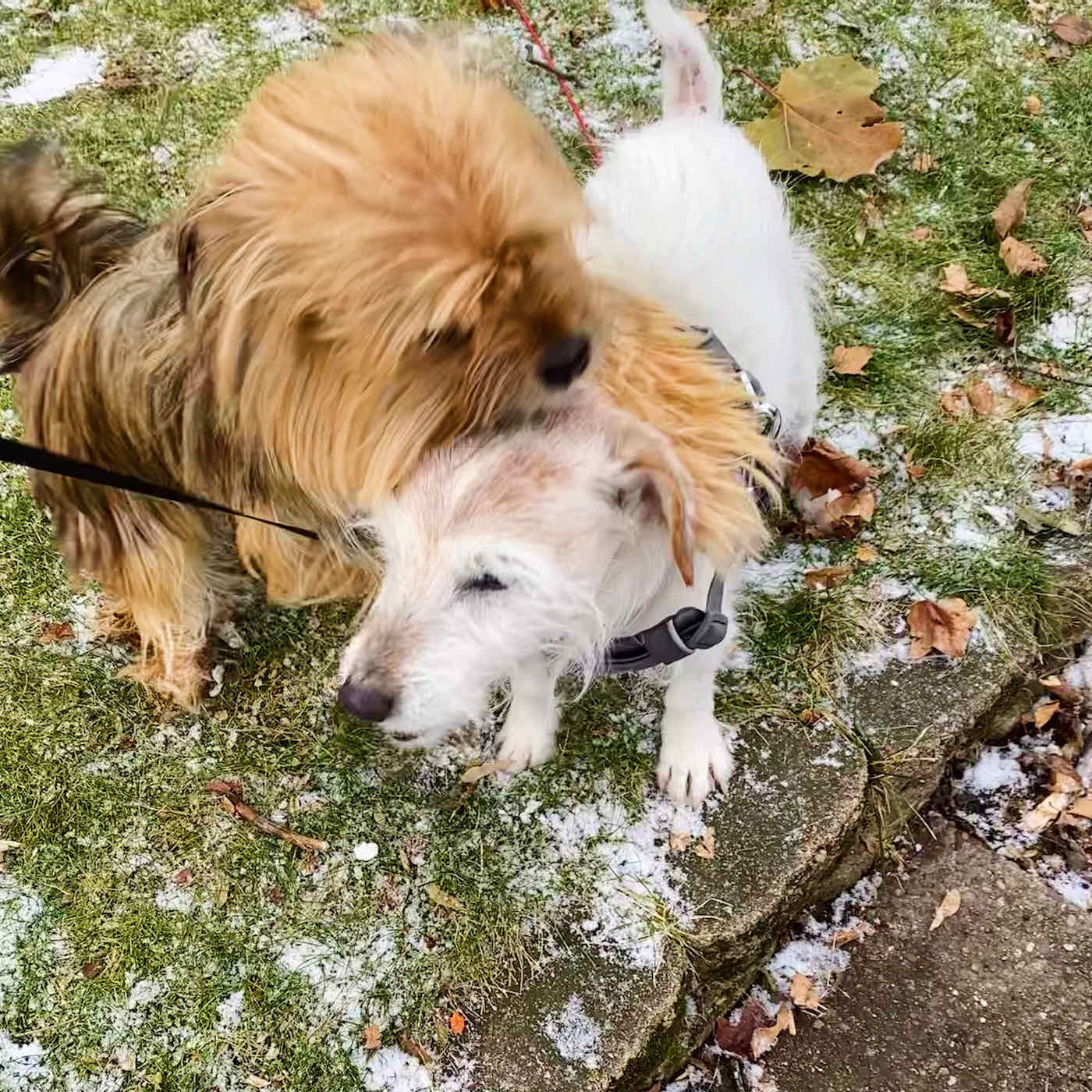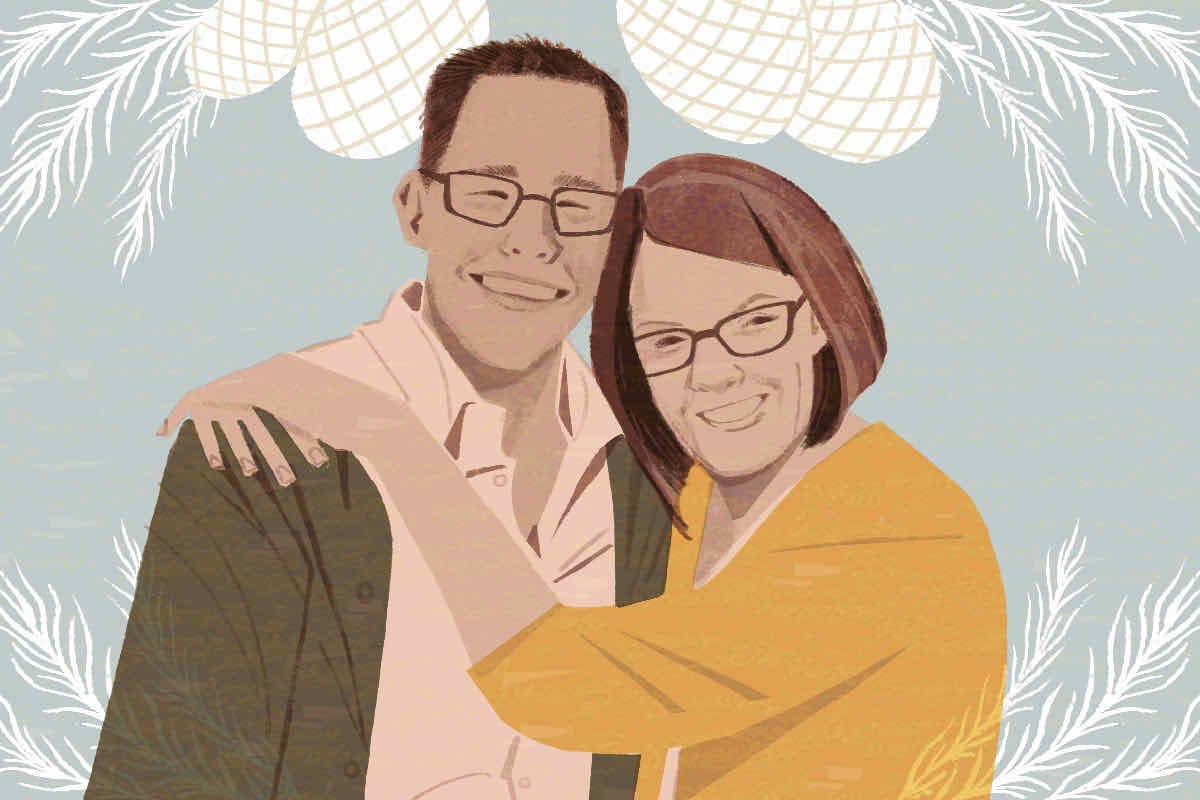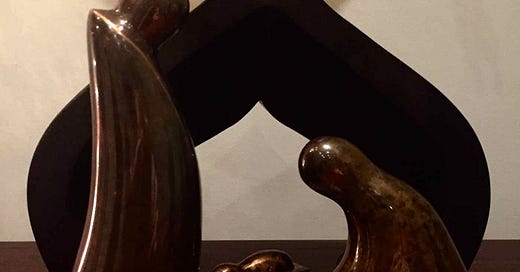The True Christmas Spirit
Some fragmented thoughts on feeling whatever you're feeling during the holidays, the swirling emotions within the original Christmas story, and a song about Emmanuel
Thursday, December 23
Houston, Texas
Greetings, dear reader!
Yesterday, while I was doing the NYTimes crossword, I was surprised by one of the clues: “Jovial seasonal mood.” The answer the puzzle wanted was “Christmas spirit.” This irritated me. I cannot typically be described as “jovial.” Does that mean I can’t have the Christmas spirit? Fozzie isn’t exactly the merriest of dogs. Does that mean he can’t have the Christmas spirit?

Scrolling my social-media feeds, I see so many friends lamenting that they, too, do not have the Christmas spirit. They’re sad. They’re struggling. They’re weary. With all the grief of yet another exhausting year and all the worry surrounding an ever-morphing virus being spewed into the air and all the sorrow of loss after loss, it’s no wonder. But then they feel even more downbeat, publicly apologizing and maybe privately beating themselves up for their unseasonable emotional weather.
I’ve been on record as being a longtime opponent of enforced merriment and cookie-cutter Christmas cheer. But as we often say at Evolving Faith, we want to be for something, not just against. So as I was pondering this whole Christmas-spirit thing, I thought: I want to be for whatever the original Christmas spirit was.
I went back to Luke’s account of Jesus’s birth, and—surprise, surprise—there’s so much more texture, so much more room for us to imagine the emotional contours of the event, than your typical church Christmas pageant would ever allow. What if we’ve sanitized Scripture so much that we’ve lost all the facets of what the Christmas spirit was and is and might be? What if there was, in that first Christmas, not only joy and hope but also more—more complication, more ambivalence, more mixed emotion? And what if that means that there’s room, too, for all that we might be carrying with us into this holiday?
Maybe the Christmas spirit is that of a newborn infant, his lungs gasping for air and his little fingers grasping for whatever beyond the safety of a womb. It is his vulnerability.
Maybe the Christmas spirit is that of a young woman exhausted from childbirth. It is her exhaustion and her exhilaration, her worry and her wonder.
Maybe the Christmas spirit is that of a young man who has watched his beloved bring a baby into the world—a baby that both is and is not his own. It is his determination and his confusion, his preparation for an uncertain future and his fear about what others might say.

Maybe the Christmas spirit is that of the shepherds, who were just minding their own business when they were interrupted by an otherworldly being. How were they supposed to make sense of the nonsensical? “Do not be afraid”? Seriously?
Maybe the Christmas spirit is that of a household disrupted—the host family now counting one more visitor, the animals braying and baa-ing as they too made space for visitors.
Maybe the Christmas spirit is that of everyone else nearby who had heard the wails of a woman in labor—and then the blessed cries of a newborn. Curiosity, nosiness, a desire to help: Surely there was some nosy neighbor struggling with the temptation to see what was going on next door, or perhaps another who headed over with a pot of hot water, just in case. Sadness, heartbreak, even jealousy: I wonder whether there might have been someone in the community who had recently lost a child, and try as they might, they couldn’t tamp down their own sorrow at the sound of what would be, for another newly expanded family, delight.
Maybe the Christmas spirit is that of Cousin Elizabeth, who must have known that it was just about time for Mary to give birth. Imagine her anxiously awaiting news from afar and sending up a prayer for her loved ones as she nursed her own son.
Maybe the Christmas spirit is that of wise ones, searching the sky for signs and venturing off hopefully into the unknown.
Maybe the Christmas spirit is that of a world still struggling, still warring, still grappling, still wandering, and a people waiting for liberation and yearning for new possibility. They can’t yet know the good news that has come alive in their midst.
Maybe the Christmas spirit is simply whatever we have, whoever we are, whatever we feel.
If Emmanuel really does mean “God with us,” it seems irrational to say otherwise. There is no emotional litmus test for admission into the Christmas miracle. So what point is there to pretend that we are more cheery than we actually are? If the story is true, then God must be with us in all of it and through all of it: throughout the lament lifted up at midnight, the longing that perseveres all day long, the generosity that bubbles up in surprising moments, the strange hope that refuses to die even in the face of devastating data.
Anyway, I am especially thankful when I remember that Christmas isn’t just a day; it is also a season. So there is plenty of room—room for the delight as well as for the sadness, for the laughter as well as for the tears, for the feast and for the leftovers, for a raucous family gathering, maybe, but also for the quiet moments in the aftermath, for the understanding and for the mystery. I’m grateful, too, that, glum as I might feel heading into this Christmas, I’ve known happier ones before.
When I was a kid, we usually gathered with my father’s side of the family for Christmas; nearly all of my mother’s side lived on the other side of the ocean. Before dinner, my aunt would ladle out bowls of soup—rich broth, which had been simmering for hours, with Chinese mushrooms and dried scallop and cloud-ear fungus. Then we’d fill our plates with a typically motley immigrant-family feast: perhaps turkey, which people ate mainly out of politeness; the meats we really wanted, including roast duck and barbecued pork and roast pork with crispy crackling; Chinese greens; braised mushrooms; green-bean casserole, because maybe someone thought it would make us more American; some kind of noodles; always rice. And after, we’d open presents.
My grandmother was always a stoic presence at these gatherings. (Maybe I inherited my lack of joviality from her.) What I remember most: her alert eyes and her methodically busy hands. As the kids flung bows and ribbons everywhere, she would take those discards and tuck them into a bag. As we expressed excitement over what we’d just unwrapped—or, in my case, I have to confess, as I feigned my thanks, because I was never an easy child to shop for and could be an ungrateful little jerk—she’d gather whatever remnants of wrapping paper that had not been torn to shreds. She’d patiently ease off the bits of tape. Then she’d carefully smooth the paper, folding it into neat rectangles.
When I was a kid, this seemed weird to me, much as I adored my grandmother. In retrospect, though, I’m awed by her attentiveness and respectful of her thrift. It now tells me a story of someone who has seen all kinds of Christmases: There were the wartime ones, when she was a refugee. The one marked by the grief of the recent death of one of her young children. The ones when her husband was not at home, because he was pastoring across the border in Communist China. The ones as she tried to make a new home in a country not her own. The ones during which her adult children bickered endlessly and paused their shouting only for the pre-dinner prayer. The ones where we brought our news of broken marriages and new engagements. The ones when she patiently spoon-fed my grandfather after he was partly paralyzed by a stroke. The ones that happily brought us back home to California after we’d moved thousands of miles away.
Through all those Christmases, my grandmother was convinced, as much as anyone I have ever known, of the goodness of the God who is with us. What was her Christmas spirit? Sorrow and gladness, I’m guessing. Grief deeper than anything she ever expressed in words, perhaps, but also a patience that I can only aspire to. It’s funny: I can’t say that I remember the sound of her laughter well, because it was rare and fleeting. But I can still see the look of contentment on her face as she sat, wrinkly hands folded on a neat stack of used wrapping paper in her lap, regarding her kids and her grandkids and what goodness life had brought.
In the way she saved that wrapping paper, I can now understand that there was also an abiding and abundant hope: There would be another Christmas to come, and another after that, and another after that. We had to be prepared, because we were still waiting—are still waiting—for yet more good news. And she believed with all her heart that it would soon come.
What I’m Listening to: For this last stretch of Advent and into Christmas, I’ve been listening to “Longest Nights,” by the Chicago-based collective The Many":
You shouldn’t be here tonight
It doesn’t seem quite right
Here where the shots ring out
Where everything’s burning now
Where there are a hundred words for pain
How could you end up in this place?
Emmanuel, Emmanuel
God with us
Love for us
Born into the longest nights
Emmanuel
We’re in Texas for Christmas with Tristan’s family. Before I go immerse myself in a giant vat of queso, two things:
1) Last month, I got to have a long, lovely conversation with the legendary Krista Tippett for her show, On Being. It’s out today. We talked about Wholehearted Faith and my friendship with Rachel, of course, but Krista also wanted to know about my own spiritual roots and the Farminary. And finally—finally!—I successfully snuck the word “gaysian” into an interview. Let me know what you think!

2) I’d like to wish you a Christmas that is good. For some of us, a good Christmas might not be a merry one or even a particularly happy one. For some of us, a good Christmas this year will be different from one in other years; we didn’t get a tree this year, nor did we put up a single decoration. Yes, I wish you a Christmas marked by goodness, whatever that might mean to you right now.
As always, it’s a gift to me to know what’s going on with you and to be able to remember that in prayer. This can be such a tender time for many people. If there’s anything specific you’d like to share, please leave a comment, simply reply to this email, or send a note to makebelievefarmer@gmail.com.
Whatever you’re feeling, wherever you are, may the holy day as well as the season that follows surprise you with its goodness and steady you with its hope. May you experience gentleness—toward yourself as well as toward others. May you be met by warmth. And may you be reminded, again and again, just how beloved you are to Emmanuel, the God who is with us and for us and in us.
As always, I’m so glad we can stumble through this together, and I’ll try to write again soon.
With warmest wishes from my home to yours,
Jeff




I listened to the podcast with Krista today. IT WAS ABSOLUTELY AMAZING. I listen to On Being all the time. This was one of the best. Not just because it was you Jeff but the way Krista lead your conversation was different than her usual. There was a depth, a deeper spiritual side to it that ran through its entirety. I listened to the uncut episode which had so many details and reflections that would be sadly deleted in the 53 minute episode. Thank you for bringing your whole self to us here. Merry Christmas to you and Tristan and Fozzie
You’ve captured so much of what I’ve been feeling. I lost my son in a tragic death in May. This will be the my first Christmas without him. I’ve been living in the midst of grief and gratitude. This gapping hole of loss where grief wells up and I’m stuck in the “whys” and “could have beens” and longings. But there’s also this unmistakable goodness that surrounds me from the people who are helping me walk until I can see the world in color again….to my dogs who have been a saving grace….to daily reminders of all the blessings for which God has filled my life. These are my collateral joys where my grief meets up with gratitude and I find myself pondering the beauty within the mess….and that’s where I find Jesus, holding me through it all. And I can keep going into the next day……